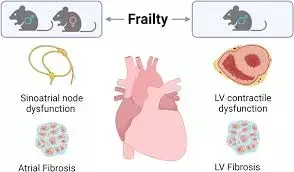- Home
- Medical news & Guidelines
- Anesthesiology
- Cardiology and CTVS
- Critical Care
- Dentistry
- Dermatology
- Diabetes and Endocrinology
- ENT
- Gastroenterology
- Medicine
- Nephrology
- Neurology
- Obstretics-Gynaecology
- Oncology
- Ophthalmology
- Orthopaedics
- Pediatrics-Neonatology
- Psychiatry
- Pulmonology
- Radiology
- Surgery
- Urology
- Laboratory Medicine
- Diet
- Nursing
- Paramedical
- Physiotherapy
- Health news
- Fact Check
- Bone Health Fact Check
- Brain Health Fact Check
- Cancer Related Fact Check
- Child Care Fact Check
- Dental and oral health fact check
- Diabetes and metabolic health fact check
- Diet and Nutrition Fact Check
- Eye and ENT Care Fact Check
- Fitness fact check
- Gut health fact check
- Heart health fact check
- Kidney health fact check
- Medical education fact check
- Men's health fact check
- Respiratory fact check
- Skin and hair care fact check
- Vaccine and Immunization fact check
- Women's health fact check
- AYUSH
- State News
- Andaman and Nicobar Islands
- Andhra Pradesh
- Arunachal Pradesh
- Assam
- Bihar
- Chandigarh
- Chattisgarh
- Dadra and Nagar Haveli
- Daman and Diu
- Delhi
- Goa
- Gujarat
- Haryana
- Himachal Pradesh
- Jammu & Kashmir
- Jharkhand
- Karnataka
- Kerala
- Ladakh
- Lakshadweep
- Madhya Pradesh
- Maharashtra
- Manipur
- Meghalaya
- Mizoram
- Nagaland
- Odisha
- Puducherry
- Punjab
- Rajasthan
- Sikkim
- Tamil Nadu
- Telangana
- Tripura
- Uttar Pradesh
- Uttrakhand
- West Bengal
- Medical Education
- Industry
Frailty significantly elevates risk of adverse outcomes among patients undergoing CABG, reveals study

Frailty significantly elevates the risk of adverse outcomes among patients undergoing CABG, reveals a study published in the BMC Surgery.
Coronary artery bypass grafting (CABG) remains the preferred treatment for complex multi-vessel coronary artery disease, offering substantial long-term benefits. Non-cardiac comorbidities such as frailty may significantly affect the outcomes of this procedure. However, the exact impact of frailty on CABG outcomes remains unclear, particularly given its exclusion from many pivotal revascularization trials.
This systematic review and meta-analysis aimed to consolidate existing data to evaluate the impact of frailty on short- and long-term outcomes following CABG. Searches across PubMed, Cochrane Library, Embase, and Scopus were done to identify studies that were published up to March 31, 2024, had detailed preoperative frailty assessments and compared frail versus non-frail adult patients undergoing CABG. Primary outcomes were all-cause mortality and major adverse cardiac events within one year. Secondary outcomes included hospital readmission rates and length of stay.
A random-effects model was used to account for heterogeneity. Results were reported as odds ratios (OR) or mean differences (MD) with 95% confidence intervals (CI). Results: The meta-analysis, involving data from 14 studies, revealed a significant increase in both 30-day (OR 2.52; 95% CI: 2.07 to 3.07) and 1-year mortality (OR 2.58; 95% CI: 1.49 to 4.45) among frail patients.
The risk of acute cardiac and cerebrovascular complications was comparable in all patients (OR 1.03; 95% CI: 0.89 to 1.19). However, frailty was associated with a significant increase in the risk of acute kidney injury (OR 2.31; 95% CI: 1.26 to 4.23). Frail patients were more likely to have longer hospital stays and higher readmission rates compared to their non-frail counterparts. The study confirms the critical impact of frailty on mortality and morbidity in CABG patients and advocates for the integration of frailty assessments into the preoperative evaluation process. Addressing frailty can lead to more individualized patient care and better outcomes, urging a paradigm shift towards comprehensive, patient-centric management in cardiac surgery.
Reference:
Chen, S., Zhang, S., Cai, S. et al. Impact of frailty on outcomes following coronary artery bypass grafting: a systematic review and meta-analysis. BMC Surg 24, 419 (2024). https://doi.org/10.1186/s12893-024-02728-1
Dr. Shravani Dali has completed her BDS from Pravara institute of medical sciences, loni. Following which she extensively worked in the healthcare sector for 2+ years. She has been actively involved in writing blogs in field of health and wellness. Currently she is pursuing her Masters of public health-health administration from Tata institute of social sciences. She can be contacted at editorial@medicaldialogues.in.
Dr Kamal Kant Kohli-MBBS, DTCD- a chest specialist with more than 30 years of practice and a flair for writing clinical articles, Dr Kamal Kant Kohli joined Medical Dialogues as a Chief Editor of Medical News. Besides writing articles, as an editor, he proofreads and verifies all the medical content published on Medical Dialogues including those coming from journals, studies,medical conferences,guidelines etc. Email: drkohli@medicaldialogues.in. Contact no. 011-43720751


